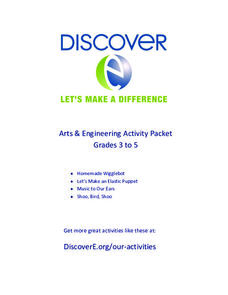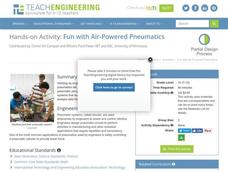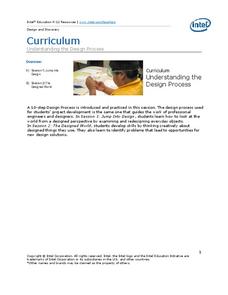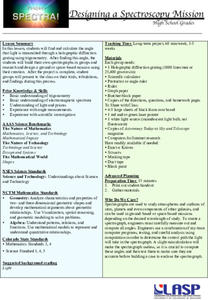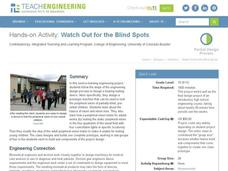NOAA
Invent a Robot!
Wait til your class gets their hands on this! Aspiring engineers design a working robotic arm in the fifth and final installment in a series of ocean exploration lessons. Pupils learn about the use of underwater robots in ocean...
Kenan Fellows
Evaluating Sensors and the Impacts of Physiological Stress: Designing a Wearable Device for Rescue Workers
A long-term project has scholars consider ways in which sensors help monitor physiological stress levels of rescue workers. They design and create a portable device for this purpose. Techies to the rescue!
DiscoverE
Arts and Engineering Activity Packet: Grades 3-5
Art and science sometimes go hand in hand. A set of four activities for learners in grades 3-5 teaches engineering concepts as part of art projects. Class members build homemade robots, elastic puppets, musical instruments, and...
Bonneville
Engineering 101
Make a structure too sturdy to fail. Scholars first watch a video and consider the reasons for the Tacoma Narrows bridge collapse. They take part in two engineering challenges, one using newspapers and the other using spaghetti sticks...
Teach Engineering
Portable Wheelchair Ramp Challenge
Ramp up the engineering design process in your classroom with an activity that challenges teams to design, build, and test a small-scale portable wheelchair ramp. The class develops design requirements, and teams test their designs...
Teach Engineering
Fun with Air-Powered Pneumatics
How high did the ball go? Engineering teams build a working pneumatic system that launches a ball into the air. The teams vary the amount of pressure and determine the accompanying height of the ball. An extension of building a device to...
Kenan Fellows
The Newton Challenge
Make Newton proud. Scholars apply their understanding of forces and energy to an engineering design challenge. They learn about simple machines, create a presentation on Newton's laws, and develop a balloon-powered car.
Scholastic
STEM Challenges and Activity Sheets 3–5
How can engineers help their communities? Three challenges in the first unit explore why STEM is important to communities and how neighborhoods are engineered to experience those benefits. The second unit prompts groups to plan an...
Purdue University
The Represented World: Recreational STEM
How are forces and motion important to a swing set? Scholars explore the concepts of force and motion using swing sets. In preparation for their own STEM design project, individuals take surveys and data from peers, complete labs on...
Teach Engineering
Designing a Spectroscopy Mission
In this mind-bending activity, young engineers explore this question of whether or not light actually bends. Using holographic diffraction gratings, groups design and build a spectrograph. The groups then move on research a problem...
Intel
Understanding the Design Process
Can you build a better mousetrap? Broken into two sessions, this plan introduces learners to the design process. The first session has pupils look at the world through a design perspective by redesigning everyday objects. In the second...
Kenan Fellows
Engineering Skills Through Problem Based Learning
Navigate the ups and downs of learning about energy. Future engineers consider how potential and kinetic energy apply to roller coasters. They design a roller coaster of their own and then use computer design software to showcase their...
Autodesk
AutoCAD 360
Take your drafting and design projects on the go with with this mobile computer-aided design program. Allowing users to view, edit, and share their work with others, this is a great resource for developing the technical drawing...
University of Colorado
Designing a Spectroscopy Mission
Design a mission over the rainbow. Small groups spend several weeks together determining a mission related to spectroscopy. The teams build spectrographs and analyze the design to determine whether it will carry out the mission. At the...
Teach Engineering
Watch Out for the Blind Spots
Applying engineering concepts to the field of medicine, pupils design a device to help test peripheral sight. The class learns and follows a specific design process for engineers before separating into groups; each group builds...
Intel
Designer Genes: One Size Fits All?
In this STEM group of 10 activities, lesson two focuses on the question, "Just because we can, should we?" when considering genetically engineered food. Classes hear a scenario and, as young scientists and geneticists, must determine if...
Teach Engineering
The Magician's Catapult
Class members work in pairs to build a catapult to launch a grape a given distance. The catapult project, a compound machine, reinforces pupils' understanding of simple machines.
Teach Engineering
Projections and Coordinates: Turning a 3D Earth into Flatlands
Introduce your class to map projections and coordinates, the basics for the work done in a GIS, with an activity that uses Google Earth to challenge learners to think about the earth's shape.
California Academy of Science
Fresh Solutions: Design Thinking Challenge
How do people transport fresh water long distances to ensure everyone has access to it? The final lesson in the 10-part Fresh Solutions unit encourages individuals to design their own solution, or solutions, to that very problem. Groups...
Bonneville
Unique Solar Cell Engineering Report
Highlight a unique solar cell with a report and a poster. Scholars complete the ongoing solar cells project by writing an engineering report in the last of 14 lessons in the Cost Effective Solar Cells unit. They also create research...
Beyond Benign
House Project Overview
What does your perfect house look like? Pupils design a sustainable house given certain specifications. They create concept maps that detail the math skills they need to use while considering their designs.
Teach Engineering
Fairly Fundamental Facts About Forces and Structures
Don't twist and turn looking for a resource. The first installment of a six-part series teaches young engineers about the five fundamental forces of compression, tension, shear, bending, and torsion. These forces help explain different...
DiscoverE
Marble Run
It's time to slow your roll! Can your class create a track that allows a marble to roll as slowly as possible? Teams of science scholars collaborate to design, build, and test their tubes while learning about gravity and friction.
Teach Engineering
Above-Ground Storage Tanks in the Houston Ship Channel
Introduce your class to storage tank failures caused by major storms with an activity that looks at how the concepts of Archimedes' Principle and Pascal's Law affect the storage tanks along the Houston Ship Channel. The background...




